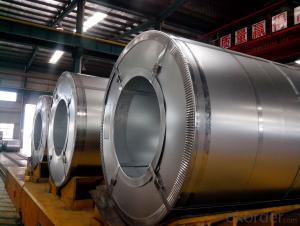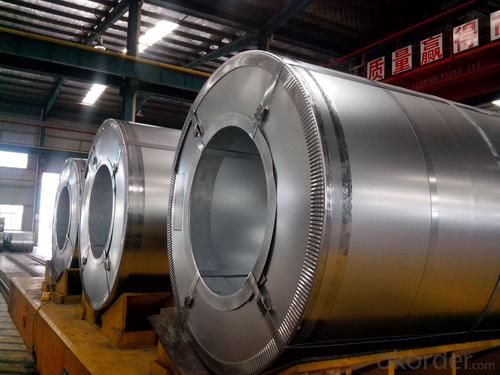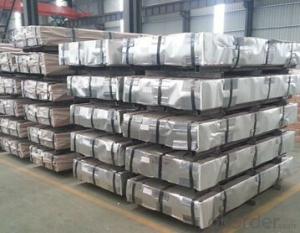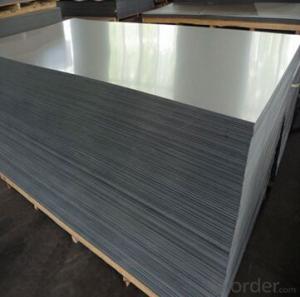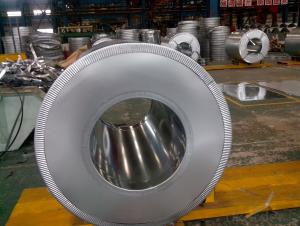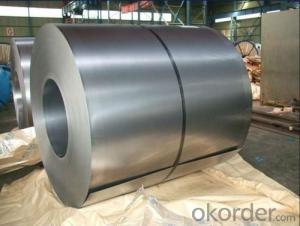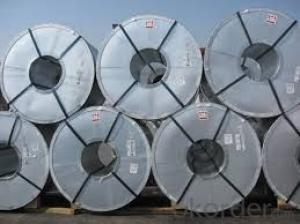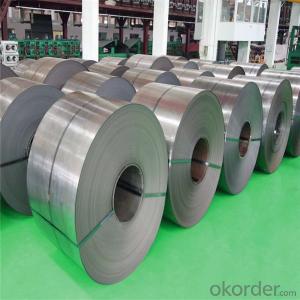Galvanized steel coil Z275 No spangle SIZE:0.5*1000/1200mm
- Loading Port:
- Tianjin
- Payment Terms:
- TT OR LC
- Min Order Qty:
- 100 m.t.
- Supply Capability:
- 10000 m.t./month
OKorder Service Pledge
OKorder Financial Service
You Might Also Like
cold rolled hot dip galvanized steel coil
Galvanized steel coils are widely used in the construction industry, as raw material for the production of corrugated panels, fencing products, drywall panel profiles, ventilation systems etc. Recommended for both outside and inside usage, galvanized steel has a high resistance to corrosion in different environments, due to a protective layer of zinc of 100 – 180 grams per square metre.
Hot-dip galvanized steel coils are produced by immersing steel in a zinc bath. An appropriate galvanizing process requires a pretreatment process during which the steel passes through different baths which prepare the surface for zinc coating. In this stage, chemicals are used to clean the surface of the steel. After the chemical treatment, the steel coils pass through a bath of melted zinc at temperatures around 460 ° C. The resulting uniform coating is finished through a process of skin-passing to provide smooth and shiny appearance of the finished product. To store for a longer period, the hot-dip galvanized coils can be delivered with a final oil coating, according to the customer’s demand.
PROFILAND STEEL produces hot-dip galvanized steel coils with very good workability at further cold forming and bending processes.
Technical specification for the hot-dip galvanized produced by PROFILAND STEEL::
• Steel grade: DX51D+Z• Zinc coverage: 30-180 g/sqm on both sides (depending by the requested specification);• Thickness: between 0,2 mm and 1,00 mm;• Width: 600mm,914mm,1000mm, 1220mm and 1250 mm;• Coil weight: 4-6 mt;• Coil ID: 508 mm;• Coil OD: 900-1500 mm ;
Depending on their usage, the hot-dip galvanized coil can be delivered slightly oiled.
- Q: What are the different types of steel coil packaging techniques?
- There are several types of steel coil packaging techniques, including banding, strapping, shrink wrapping, and palletizing. Banding involves securing the coil with metal bands, while strapping uses plastic or steel straps. Shrink wrapping involves wrapping the coil with plastic film and applying heat to shrink it tightly. Palletizing involves stacking the coils on a pallet and securing them with stretch wrap or straps. These techniques help protect the coils during transportation and storage.
- Q: - I'm considering doing my physics coursework on the uses of Mild Steel in skyscrapers and construction, would this be right? Some sources tell me mild steel is too weak, others say it is fine
- Mild steel doesn't really mean anything, technically. In today's world all steel is mild steel unless it's high carbon or alloy, which are mostly tool steels. You'll need to study steel much deeper than that to accomplish any real physics work relating to steel.
- Q: What are the dimensions of steel coils used in the metal furniture industry?
- Steel coils used in the metal furniture industry come in varying dimensions, depending on the specific requirements of each manufacturer. Commonly used dimensions include coil widths that range from 24 to 60 inches (61 to 152 cm) and coil diameters that range from 36 to 72 inches (91 to 183 cm). The thickness of the steel coils can also vary, typically falling between 0.020 and 0.250 inches (0.05 to 0.64 cm). These dimensions enable manufacturers to efficiently produce a variety of metal furniture, such as chairs, tables, and cabinets, by utilizing the steel coils as raw materials in their production processes.
- Q: How are steel coils inspected for impact resistance using impact testers?
- To assess the impact resistance of steel coils, specialized machines called impact testers are utilized. These machines are designed to evaluate the coils' ability to endure impacts. The process involves subjecting the coils to controlled impacts and measuring the resulting deformation or damage. Initially, the steel coils are securely positioned and oriented on the impact tester. This ensures accuracy and consistency. The tester is equipped with a striking element, like a pendulum or falling weight, which applies a specific force upon impact. The element is aligned precisely with the steel coil for precise testing. Once the setup is complete, the impact tester is activated, and the striking element is released to impact the steel coil. The force of the impact is carefully controlled and measured to ensure consistency across multiple tests. The tester records various parameters, including applied force and impact duration. After the impact, the steel coil undergoes a thorough examination for visible deformation or damage. This includes checking for dents, cracks, or any signs of structural compromise. The extent of the deformation or damage is recorded and compared to predetermined acceptance criteria to determine if the coil passes or fails the impact resistance test. To gather additional data during testing, impact testers can be equipped with various sensors and cameras. High-speed cameras capture the impact in slow motion, allowing for detailed analysis of the coil's behavior. Strain gauges can also be attached to the steel coil to measure strain and stress experienced during the impact. In conclusion, the use of impact testers offers a reliable and standardized method for inspecting the impact resistance of steel coils. By subjecting the coils to controlled impacts and accurately measuring deformation or damage, manufacturers can ensure that their steel coils meet the required impact resistance standards for different applications.
- Q: How are steel coils used in the energy sector?
- Steel coils are used in the energy sector for various purposes, primarily in the construction and maintenance of power plants and transmission infrastructure. They are commonly used in the manufacturing of turbines, generators, and transformers due to their strength and durability. Steel coils are also used to fabricate pipelines and storage tanks, which are essential for transporting and storing oil, gas, and other energy resources. Additionally, steel coils play a crucial role in the construction of wind turbines, providing support and stability to these renewable energy sources.
- Q: I wanna strip down my bike and take off all the paint... im thinking of leaving it just the steal color... Do i need to put anythinng on the steel to coat it or can i just leave it like that... Will it rust or anything?
- There is another thing you can do to inhibit corrosion on bare metal surfaces. Use a good quality automotive wax. Apply it with diligence, and keep the bike in the garage when you're not using it so it stays dry. Touch up the wax job every now and then to maintain the protective finnish.
- Q: Are steel or graphite clubs better?
- If its for your bf, i would buy steel. Most guys prefer steel because it is more accurate and it think every guy on the pga tour uses steel shafted irons. Steel also usually costs less, which helps. Neither one is better, its just a matter of personal preference.
- Q: I'm getting microdermals, from a very experienced piercer, but they don't have titanium and I know titanium is the best for this, but is Grade A Srugical Steel okay too?(P.S. also instead of getting flat heads, of the microdermals, I'm getting flat crystal like ones, are those okay? I know to be careful, I am veryyyy careful with my body, so much that I'm worried I'm going to overly do it when I get them and dry out the skin or something hahaa xp)THANK YOU ALL IN ADVANCE FOR THE HELP
- Well a lot of people get microdermals done with surgical steel,yes titanium if better but it can be done with surgical steel.If you want the titanium you can always ask the piercer where they get their jewelery and if they could order them for you.You could also go to a different shop and ask if they have titanium dermals you should be able to buy them off of them.If hes an expensive piercer and your paying a lot for them you should be able to get the ones YOU want.Its YOUR body not theirs. =] hope this helped.
- Q: What are the different types of steel coil coating materials?
- There exist various steel coil coating materials utilized in diverse industries and applications. Some frequently encountered types encompass: 1. Polyester: Renowned for their resilience and ability to withstand weathering, polyester coil coating materials find frequent application in outdoor settings like roofing and cladding. They offer exceptional protection against fading, chalking, and corrosion. 2. Polyvinylidene Fluoride (PVDF): PVDF coil coating materials exhibit remarkable resistance to chemicals, UV radiation, and weathering. They are commonly employed in architectural contexts, providing prolonged color retention and excellent defense against harsh environmental conditions. 3. Polyurethane: Possessing a high degree of flexibility and adhesion, polyurethane coil coating materials prove ideal for scenarios necessitating resistance to abrasion, impact, and bending. The automotive and appliance industries commonly rely on them. 4. Epoxy: Epoxy coil coating materials are celebrated for their remarkable adhesion and corrosion resistance. Industries such as metal furniture, storage tanks, and machinery frequently utilize them to ensure long-lasting protection against chemicals and abrasion. 5. Silicone Modified Polyester (SMP): SMP coil coating materials combine the robustness of polyester with the flexibility of silicone. They are prevalent in agricultural and industrial settings, offering outstanding resistance to chipping, cracking, and peeling. These merely serve as a few instances of the diverse array of steel coil coating materials currently available in the market. The selection of a coating material hinges upon the specific requirements of an application, including durability, weather resistance, chemical resistance, and aesthetics.
- Q: Will a 1 inch thick A36 steel target withstand a 7.62x54r round?
- it depends on the type of steel. If it's soft steel it may stop the round, but leave a craterthat can causeirregular ricochets. If it's hardened steel (AR500 for example), the bullet will just 'splash' and fragment into little bits. It's better to shoot thin steel so the round goes through than shoot thick soft steel thatforms a crater. No matter what type you're shooting, put it no closer than 100 yards for a full power jacketed round. Try to hang the plateso it is angledslightly towards the ground so anymajor ricochets are directed into the ground and not up or back towards you.
Send your message to us
Galvanized steel coil Z275 No spangle SIZE:0.5*1000/1200mm
- Loading Port:
- Tianjin
- Payment Terms:
- TT OR LC
- Min Order Qty:
- 100 m.t.
- Supply Capability:
- 10000 m.t./month
OKorder Service Pledge
OKorder Financial Service
Similar products
Hot products
Hot Searches
Related keywords
